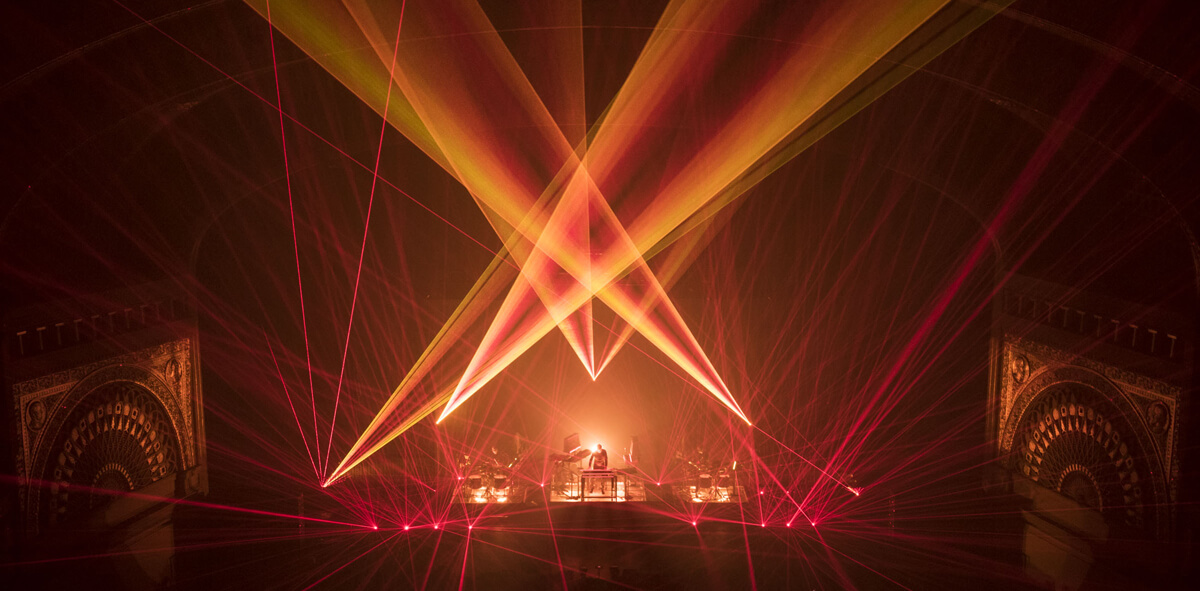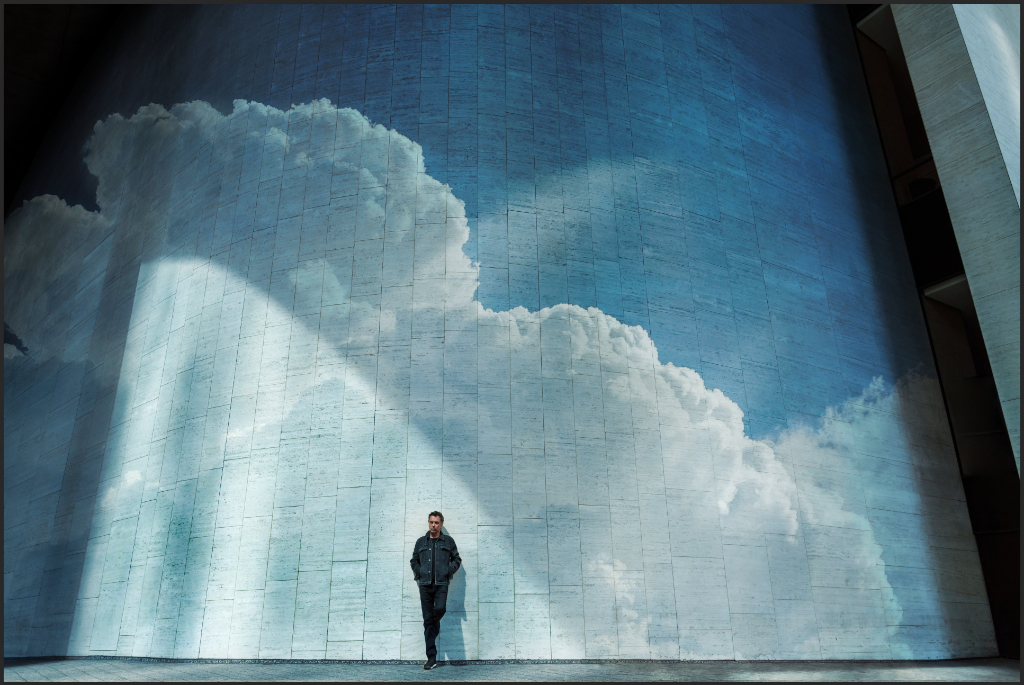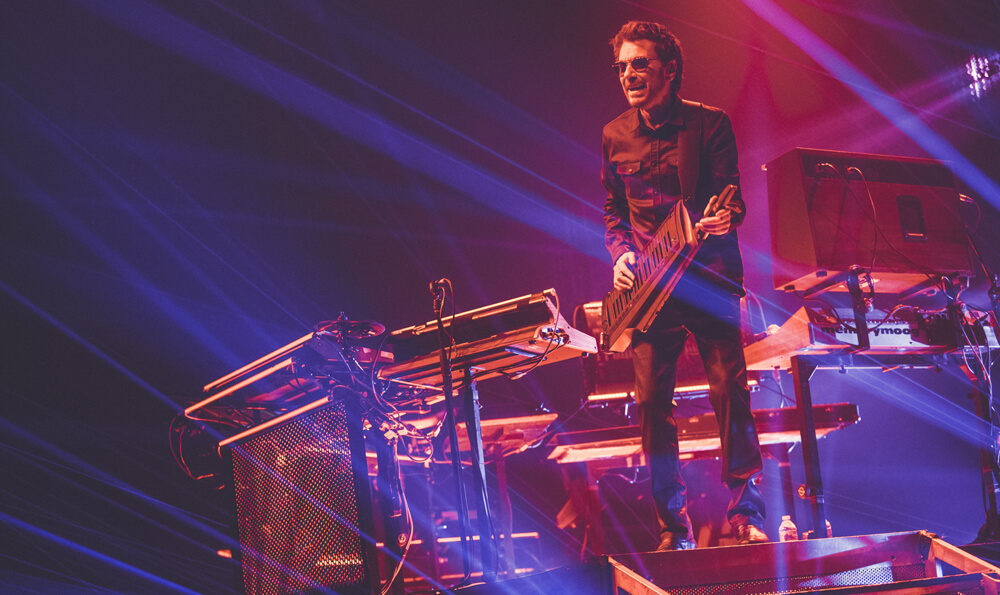Interview by Lula Criado

Jean-Michel Jarre. Where to begin? A goodwill ambassador for Unesco, president of the CICAC (the global body for authors’ societies), recipient of the Stephen Hawking Medal, holder of the Guinness World Record for attracting the largest concert audience in history, ground-breaking composer and performer, and the master of electronic music.
I meet Jean-Michel Jarre in a small room in the London office of his record label. In person, he is thoughtful, smart, and charming – he turned 70 last August, but he looks about a quarter of a century younger–. Jarre looks exhausted (he has been travelling quite a lot promoting his latest album Equinoxe Infinity), but he talks passionately about science, the environment, and the way technology has defined his creative process; I realised that I probably spend more time with technology and machines than human beings.
With over 80 million albums sold worldwide to date, Jarre’s influence on electronic music goes beyond breaking down boundaries of composing with albums like Oxygène, Équinoxe, Magnetic Fields, Rendezvous, or AERO —the first album mastered for 5.1 system sounds. His outdoor concerts are spectacular live shows that came to define his career in the 1980s and 1990s.
Since then, his shows have been the seed that has inspired many others –we can feel the aesthetics of his shows in current productions and audiovisual shows of EDM. Jarre played in post-Mao China in 1981 (he is the first Western musician invited officially to perform in China), in Moscow in 1997, in The Sahara Desert in 2006, and in the Great Pyramid of Giza in Cairo in 2000. Most recently, he played in front of the ancient Masada fortress in Israel to draw attention to the urgency of saving the Dead Sea, shared by Israel, Jordan and the Palestinian territories and to highlight the anti-environmental policies of Donald Trump, a climate change denier.
Jarre composed Oxygène, his best-known album with over 18 million copies sold worldwide, as a manifesto for climate change when there weren’t many people interested in the environment. Even the cover of the vinyl, a decaying skull superimposed on Earth, has turned out to be a premonition 40 years later We are actually a kind of cancer of the planet, and that has to be addressed. And I couldn’t agree more. Researchers and scientists are talking about a ‘biological annihilation’ and the ‘sixth great extinction of animal species’ as a study published in Nature last year reveals that billions of populations of animals have been lost in recent decades. Species are becoming extinct up to 100 times higher than would have been without human impact.
The interview progresses, and Jarre talks about his brand new album Equinoxe Infinity, the sequel to his 1978 album Équinoxe. He explains how artificial intelligence and machine learning are shaping the future; artificial intelligence can really transform our society positively and also can help us to understand much better environmental issues at the same time“.
Jarre is fascinated with the cover of the Équinoxe album, it was quite special because it has these kinds of creatures looking at you with binoculars. So he took Michel Granger’s design for Équinoxe as an inspiration to compose the music for an album that symbolises the evolution of technology. Jarre speculates about two possible futures represented by two different covers. One [cover] is more peaceful, greener and blue, a kind of utopia in a sense, and the other one is more dystopian, apocalyptic, and dark. So what future is the most realistic? Only time will tell. In the meantime, Jarre has partnered with TheWaveVR, a VR platform that will allow fans to host concerts in immersive virtual reality.
A pioneer in merging music with technology, Jarre likes the excitement of exploring new concepts, new instruments, and new software. Trying to find another way to deal with technology for his album Electronica Volume II: The Heart of Noise, Jarre went a step further and recorded a techno track with Snowden, the whistleblower that showed us the dark side of technology.


Your work has always been linked to time, space and science. Your brand new album Equinoxe Infinity draws on your interest in AI. Could you tell us about the intellectual process behind it?
At the beginning of my career, I did a quite successful album, Équinoxe, and the cover of this album was quite special because it has these kinds of creatures looking at you with binoculars. I’ve always been intrigued by discoveries and who these watchers are. Then for the first time, I said I would like to do another album based on the visual of the artwork: Who are these watchers? What happened to them for 40 years, and what will happen to them in 40 years from now? This symbolises the evolution of technology watching us, machines learning, I mean the process of technology taking from us, they’re learning from us.
These days lots of people are spending more time watching and looking at their smartphones and connected objects like tablets than with their own partner or family, and these technological objects are also watching us and studying us to know us better to even eventually selling products to us that we don’t really need and also spying on our private lives. So these watchers are also kind of machines. Are they artificial intelligence watching us? Are they whistleblowers? We don’t know.
So I started from this kind of imaginary scenario to write the soundtrack of this story with two different endings symbolised by two different covers. This album is released with two different covers: one more peaceful, more green and blue, a kind of utopia in a sense, and the other one, more dystopian, apocalyptic, and dark.
Could you tell us more in detail about how does the algorithm / AI work? Is it based on a trained neural network?
When I started the project, I wanted to use artificial intelligence, but I’ve been a bit disappointed with the state of artificial intelligence for music. I think it’s going to be okay for my next project because when I started this project, I was confronted with algorithms that laboriously imitate a Michael Jackson or a Beatles song and copy what you do. The algorithm gets back to you and is kind of a Bach or Pachelbel version of what you’ve done, which is not very exciting. So actually, artificial intelligence for this project is much more in terms of inspiration from the intellectual and creative point of view rather than technically.
AI is transforming society, and the creative application of AI opens new possibilities in music creation; how do you think new inventions (machine learning, Google Magenta) are impacting the landscape of electronic music (from inception to production)? Do you think AI-generated music is going to change the paradigms of music composition?
We have to admit that in 10 years or maybe sooner, you’d have an algorithm and artificial intelligence able to create original content, original movies, original music original stories. And that it’s going to change the way we are approaching the creative process. It’s not necessarily bad news because we knew that we are using only 10 per cent of our brain, so artificial intelligence may help us to use the 90 per cent that we don’t use.
I really see the future and in terms of education. The fact that not only for a creative process but generally speaking, we may use our brain not so much as a hard drive to be fed information but for leaving information on the cloud somewhere and using our brain much more as a crossroad, as an interface between different types of knowledge. And then, the creative process will evolve with these kinds of new situations for a human being. So I think this is the way that artificial intelligence can really transform our society positively and also can help us to understand much better environmental issues at the same time.
I received the Stephen Hawking medal last year for promoting science, and the opinion of Stephen Hawking said that if we don’t change, we human beings should leave this planet to colonise other planets. And the only way not to do this is if we radically change the way our societies are structured. I’m actually quite convinced that artificial intelligence can help that, and I’m not talking about transhumanism but about the algorithm.
In your opinion, are we collaborating with machines or are machines collaborating with us?
One of the tracks is called Robots Don’t Cry, and I would have called it Robots Don’t Cry So Far. I do not think that machines or robots will be able to know to feel nostalgia before the end of the century. It’s not a matter of collaboration or not. It’s a matter of trying to find another way to deal with technology with more empathy.
It’s already the case with smartphones and tablets. I mean you can, you can just check your level of cholesterol or level of pollution outside. You have lots of very exciting scenarios of that. We had this discussion two weeks ago about the Game of Go. Chinese champion played against the computer, and he was defeated every time.
The result of that was that you had almost 50 per cent of people not playing a game of Go any more people. So you could say that if artificial intelligence or algorithm is able to create original movies, stories or music as artists, are we going to be discouraged by the fact that we can’t beat the machine?
But there has always to be a human being because art is about feelings…
Yes. I’d say yes if we are talking from a scientific point of view, right? I shouldn’t be the one saying this between the two of us, but f you think that actually Astro physicians and scientists say that everything in the universe is about chemistry and chemical reactions, for centuries, we felt that clouds and smoke are random until mathematicians found the equation of smoke and clouds.
And because we are made of complex chemical reactions, we could easily imagine that the result of emotions are also very complex equations they’re created by entities like us, done with carbon, hydrogen, oxygen, and nitrogen presenting the universe. And one day, we could, for instance, find the equation of nostalgia. It’s not a kind of romantic science fiction. It could be very interesting also. The reason why that is saying that is, oh, yes, we human beings are very special because we have emotions, but the more I go in my life, the more I doubt about that. Emotions maybe are very complex equations, but it’s not impossible.
You composed Oxygène as a manifesto for climate change when there weren’t many people interested in the environment. Forty years later, not only has nothing changed but is even worse. When you composed Oxygène, did you imagine that the planet Earth would be under threat as it already is?
The Oxygène cover was quite premonitory. So this is where we are today. The main problem [of the planet Earth] is demography. As my friend Jacques Cousteau used to say, the Earth is it’s done for 800 million people until 2 billion it’s okay, but after two billion, we are too many in front of the same fridge he used to say.
The reason why when Stephen Hawking says, ‘we should leave earth at one stage to colonise other planets’ is maybe something that we should seriously consider right now, to be ready to do it before it’s too late. It’s true that today 60 per cent of wild animals are disappearing or have disappeared. And the same with fishing. We are consuming so much fish that you can’t find fish now in the ocean at a reasonable depth.
We are actually a kind of cancer of the planet, and that has to be addressed. Why are every government saying to make more babies? Just make more babies because then these babies would be able to buy more computers and more cars and make the economy stronger. That’s quite crazy.
In your career, you went from analogue to digital, covering almost all the different waves of electronic music. Do you have any favourite recordings/compositions?
I’m not into nostalgia. I’m always interested in what I’m doing now, and this project, Equinoxe Infinity, I think, is really something very special to me for lots of reasons. Because it started with the visuals and because I think that also for the first time in my life, I wouldn’t change one note.
I have always been frustrated with deadlines because I had to give the album to the record company. But this time, the record company played a trick on me because they said the deadline was the beginning of July, and then they made a mistake and said, ‘You’ll have until mid-August’. So I had all these extra period expected to adjust everything. I always wanted to adjust after an album has been finished. So this time, I have no excuse, and I would say that this album is quite the way I wanted it to be when I started.
Are there any new creative and technological territories that remain unexplored for you?
Yes. Lots every day. Art, for me, links with a constant curiosity about the evolution of technology.
You are a central master of so many parts of the creation process. What is your chief enemy of creativity?
The enemy of creativity is fascists and dictators. As artists, we have to go to countries where people are not free to express themselves. This is the reason why I went to Saudi Arabia one month ago. It was very important to me. It was a historic moment to have to be able to do an outdoor concert in front of 50,000 people, girls and boys, mixed women.
I think that artists have a responsibility because we have to make a difference between ideology and people otherwise, it’s a double punishment. People in some countries don’t have the same possibilities and the same freedom as we are it’s a double punishment to them, not giving them access to culture, to music, to movies, to literature. I think we have to go to Iran and to North Korea because the agenda of artists it’s not the same as the agenda of politicians. And that, of course, is encouraging credibility not doing this is actually collaborating with radicalisation.
You couldn’t live without…
Music. Music is an addiction. I’m very privileged. I realised that I probably spent more time with technology and machines than human beings. But I have no choice, and I am quite excited by that. Even now, I mean the kind of excitement of exploring a new concept, new instruments, new software, and it’s something that keeps me fresh, I think.





